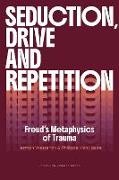Read more
This book makes the compelling argument that the key to understanding Freud's clinical writings and psychoanalytical theories lies in his trauma theory. The authors argue that Freud never truly abandoned his initial trauma theory - the seduction theory - in favour of the Oedipus complex and the primacy of fantasy. Instead, Freud progressively enriched his understanding of trauma, expanding his theory to include references to the evolution of human beings and organic life. Trauma runs as a red thread throughout Freud's oeuvre. It occupies a central position in both his clinical case studies and his meta-psychological speculations. Freud ultimately develops a metaphysics of trauma and a tragic view of human existence - a worldview that continues to resonate within contemporary philosophy and psychoanalysis.
Herman Westerink is endowed and associate professor at the Center for Contemporary European Philosophy at Radboud University Nijmegen.
Philippe Van Haute (¿) was full professor at the Center for Contemporary European Philosophy, Radboud University Nijmegen, and extraordinary professor at the University of Pretoria.
List of contents
Acknowledgements
Introduction
Chapter 1 The psychologization of trauma and the origination of seduction theory
Chapter 2 Seduction and hysterical disposition: Dora
Chapter 3 Trauma, aggression and father complex: The Rat Man
Chapter 4 Seduction, primal scene and constitution: The Wolf Man
Chapter 5 Constitution, phylogeny and evolutionary biology
Chapter 6 Traumatic neurosis, compulsion to repeat and drive theory: Beyond the Pleasure Principle
Chapter 7 Trauma and character: The man Moses
Chapter 8 Freud's metaphysics of trauma
Notes
Bibliography
Index
About the author
Herman Westerink is endowed and associate professor at the Center for Contemporary European Philosophy at Radboud University Nijmegen.

